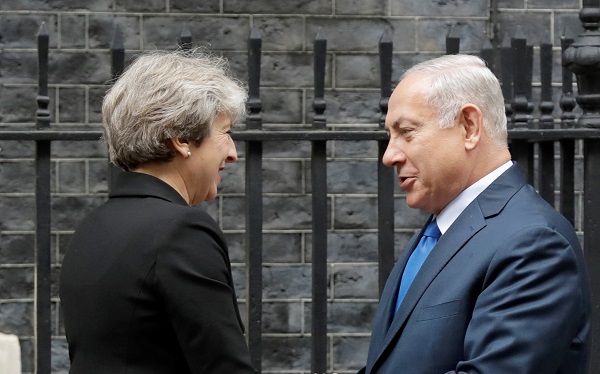
UK Prime Minister Honors Balfour Declaration, Celebrates Israel
Israeli prime minister Benjamin Netanyahu and hundreds of dignitaries attended a dinner Thursday evening in London, celebrating the 100th anniversary of the issuance of the Balfour Declaration.
The 67-word document was written as a letter during World War I by then-Foreign Secretary Lord Arthur Balfour to Lord Walter Rothschild to be sent on to the Zionist Federation of Great Britain and Ireland, and was published in the press one week later.
The first part of the declaration states. “His Majesty’s government views with favour the establishment in Palestine of a national home for the Jewish people, and will use their best endeavours to facilitate the achievement of this object… .”
“I believe it to be one of the most significant letters in history, a letter which gave birth to a most extraordinary country,” said May in the beginning of her speech.
She went on to praise the second half of the declaration as well, which took into account the sensitivity of others when it stated, “nothing shall be done which may prejudice the civil and religious rights of existing non-Jewish communities in Palestine.”
To loud applause, the prime minister then said, “So when some people suggest that we should apologize for this letter, I say ‘absolutely not.’ …We are proud to stand here today…and declare our support for Israel.” It should be noted that May has repeatedly rebuffed all Palestinian calls to express regret for the issuance of the document.
The prime minister then segued to Britain’s current relationship with Israel. Having met with the Israeli prime minister earlier in the day, May spoke of the interest she had expressed to “deepen our links in areas where Israel is leading the world…agriculture, health, science, technology and innovation.” She also tipped her hat to the existing cooperation between the two countries’ security forces, who face the same threats of terrorism.
The British prime minister openly acknowledged the constant dangers Israel faces, saying that her country is “absolutely committed to Israel’s security….and will always support Israel’s right to defend itself.” She made sure to include in this a firm rejection of any forms of boycotts, divestment or sanctions against the Jewish state.
She also strongly condemned anti-Zionism as a form of anti-Semitism.
“Today a new and pernicious form of anti-Semitism which uses criticism of the actions of the Israeli government as a despicable justification for questioning the very right of Israel to exist,” May said. “Criticizing the actions of Israel is never – and can never be – an excuse for questioning Israel’s right to exist, any more than criticizing the actions of Britain could be an excuse for questioning our right to exist.”
The Balfour declaration is generally seen as the first international recognition of the need for a homeland for the Jews, as the major Western world powers publicly endorsed it, including the United States, and it went on to form the basis of Britain’s mandate for Palestine in the 1920s.
By: Batya Jerenberg, United with Israel
